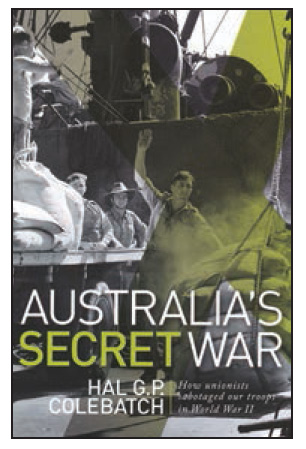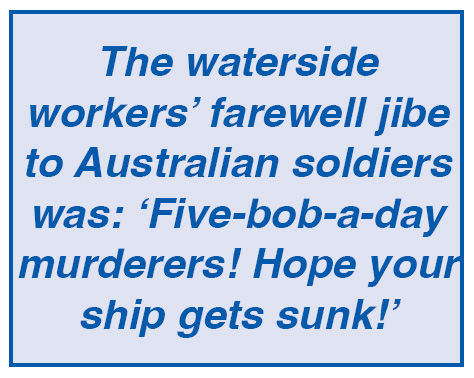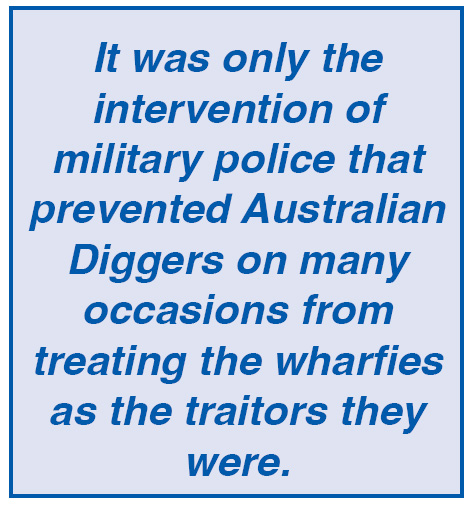BOOK SHELF Australia's own fifth column during WW2 Book review by John Morrissey
Australia's Secret War: How Unionists Sabotaged Our Troops in World War II, by Hal G.P. Colebatch (Sydney: Quadrant Books, 2013). Hardcover/paperback 340 pages. ISBN: 9780980677874
 In 2013 the late Hal Colebatch published Australia's Secret War: How Unionists Sabotaged Our Troops in World War II, which received the prize for history in the Prime Minister's Literary Awards the following year. As it punctured a leftist myth and the members of the panel which chose it were believed to have been selected by Tony Abbott, who was PM in 2014, the choice aroused howls of protest, with accusations of political bias.
In 2013 the late Hal Colebatch published Australia's Secret War: How Unionists Sabotaged Our Troops in World War II, which received the prize for history in the Prime Minister's Literary Awards the following year. As it punctured a leftist myth and the members of the panel which chose it were believed to have been selected by Tony Abbott, who was PM in 2014, the choice aroused howls of protest, with accusations of political bias.
The myth is that, while Communist-led waterside workers were guilty of strikes and go-slows during the first two years of what they regarded as a war among capitalists, after the Soviet Union was invaded by Nazi Germany in June 1941 these unionists responded to their leaders' call for an "All In" effort. The truth is that a great many of these workers did not mend their ways, and that go-slows, strikes, pilfering and even sabotage continued throughout the war. Lack of response from either the Menzies or Curtin governments can be attributed to fear of provoking further conflict, and in the case of the latter some conflicted loyalties.
Dr Colebatch's work is based not on the published histories of Australia's part in the war, but on the word of scores of veterans in the ranks of the Second AIF (Australian Imperial Force), who recall with bitterness how organised union labour on all of the Australian wharves betrayed the men at the front who were risking their lives, and indeed cost lives. Much of the evidence in this book consists of oral and written recollections from ex-servicemen, as well as extracts from contemporary letters, diaries and newspaper reports.
The story opens with the sea-borne Japanese landing at Milne Bay, Papua New Guinea, in August 1942, when the enemy seemed invincible and invasion of Australia's mainland imminent. There the AIF, militia and airmen were reduced to small-arms and light machine-guns because the waterside workers, or "wharfies", in Townsville, Queensland, had refused to load artillery provided by the U.S. forces and destined for the defence of the strategically important airfield at Milne Bay. This allowed Japanese warships to bombard the Australians without fear of retaliation.
One lengthy source is the diary of a Private Ronald Berry of 7th Batt. 7th Div. which tells of returning to Australia in 1942 from service in the Middle East, and finding wharfies on strike for danger money on the pretext of finding ammunition in a vehicle they were unloading. Troops completed this task, while the remainder of the process took days more than it should have.
Embarking from Queensland for New Guinea, he witnessed a foiled attempt to pilfer stores and the need for troops with fixed bayonets to force wharfies back to work. Their farewell jibe was "Five-bob-a-day murderers! Hope your ship gets sunk!" As his officer remarked: "No need to go away to fight the enemy, we have one right here." Returning to Cairns in 1943 with the survivors of his battalion, Berry witnessed unionists lounging about and reflected that had the wharfies of any other country behaved that way they would have faced execution.
 Further chapters are devoted to describing the same pattern all around the continent: delays on work to naval vessels, frequent confrontations between troops and waterside workers, pilfering even from soldiers, and the many occasions on which army and naval personnel carried out the required tasks in a fraction of the time taken by the wharfies. It transpired that spinning out the job during the day would take these workers into penalty rates after normal shift hours. The anomaly of their earning up to 10/- an hour while soldiers who had to carry out this work were paid 6/- a day was not lost on the servicemen forced to take up their roles.
Further chapters are devoted to describing the same pattern all around the continent: delays on work to naval vessels, frequent confrontations between troops and waterside workers, pilfering even from soldiers, and the many occasions on which army and naval personnel carried out the required tasks in a fraction of the time taken by the wharfies. It transpired that spinning out the job during the day would take these workers into penalty rates after normal shift hours. The anomaly of their earning up to 10/- an hour while soldiers who had to carry out this work were paid 6/- a day was not lost on the servicemen forced to take up their roles.
Another version of this conflict appears in Wendy Lowenstein's history of the Melbourne waterside workers, Under the Hook: Melbourne Waterside Workers Remember Working Lives and Class War, 1900–1980 (published in 1982), where we read that soldiers working on the docks performed very poorly and that go-slows were necessary to protect older workers who couldn't keep up the pace!
Some accounts record the contempt expressed by U.S. servicemen at the behaviour of the wharfies and the fact that nothing was done about it. Some of their confrontations were decided at the point of a tommy-gun, while it was only the intervention of military police that prevented Australian Diggers on many occasions from treating them as the traitors they were.
George Orwell's words would have been lost on this fifth column in a strategic industry: "If you harmed the war effort on one side you automatically help out that of the other." Excuses may be found in the presence of some Trotskyite union leaders who opposed Stalinists, such as the Melbourne Waterside Workers Federation (WWF) leader Jim Healy, who called for an all-in effort in the Soviet Union's Great Patriotic War against Fascism. However, the similar behaviour reported in every state belies the claim that everything changed after June 1941.
But why the cover-up, which persists to this day? Colebatch devotes the latter part of his book to this question. While history records ongoing industrial trouble in the vital coal industry and the angst of PM John Curtin as the responsible minister Eddie Ward played to both sides, there appears to have been a cover-up which sustains the myth.
The number of days lost on the wharves to strikes, after dropping in 1942, ballooned from 3,325 to 68,324 in 1943, at the height of war in the Pacific. As the volume of shipping from Australian ports expanded at this time, it suggests that union bastardry was largely opportunistic. Furthermore, it seems that the unions generally got their way as an ALP government turned a blind eye, while publicly addressing disputes in the coal industry, on which the nation so greatly depended.
 Colebatch also charts the more recent state-sponsored reinvention of World War II history under Paul Keating. The myth has painted the Joseph Lyons and Robert Menzies governments as appeasers who had done nothing to prepare Australia for war in 1939, assigning to the ALP and the labour movement a monopoly on patriotism. In fact, PM Curtin maintained a close friendship with his predecessor, and when he took office in 1941 he paid tribute to Menzies' preparations for war. Actually, in those earlier years it had been the Labor opposition which had been resisting the efforts of the government.
Colebatch also charts the more recent state-sponsored reinvention of World War II history under Paul Keating. The myth has painted the Joseph Lyons and Robert Menzies governments as appeasers who had done nothing to prepare Australia for war in 1939, assigning to the ALP and the labour movement a monopoly on patriotism. In fact, PM Curtin maintained a close friendship with his predecessor, and when he took office in 1941 he paid tribute to Menzies' preparations for war. Actually, in those earlier years it had been the Labor opposition which had been resisting the efforts of the government.
In his closing chapters, Colebatch canvasses a number of explanations for the perverse behaviour of thousands of otherwise normal Australian workers. Communist leadership, class warfare ideology, and words from the lips of wharfies quoted by Wendy Lowenstein justifying their "boot's on the other foot" attitude are all examined. The author's explanation finally falls on its being an early manifestation of identity politics, which transcends rational and moral judgement.
Attacks on Dr Colebatch's work as "Australia's secret (and unhistorical) war" (the ABC) and a report in the Fairfax press of those damning Colebatch's scholarship would seem to confirm this conclusion. In response to Miranda Devine's review in Sydney's Daily Telegraph, congratulating the author on a story that had been suppressed for 70 years, the Maritime Union of Australia, Ged Kearney (ACTU), historian Rohan Cahill, journalist Mike Carlton (a rival for the history prize awarded to Colebatch) and others piled on.
The book, however, is replete with meticulous footnoting, a chronological table for context, and an exhaustive bibliography. Yet its critics hid behind scholarly pretensions. The palm, however, must go to Professor Peter Stanley (UNSW, Canberra) who slated Colebatch on one disputed event described in his introduction and on his failure to consult primary evidence in WWF records held in the archives at the Australian National University. Incidentally, Stanley is the author of Bad Characters: Sex, Crime, Mutiny, Murder and the Australian Imperial Force (published in 2010) — which says it all.
Australia's Secret War is perhaps the most valuable addition to our understanding of the now receding recent past, and fully deserves Miranda Devine's description as "ground-breaking". It is a vital antidote to the largely successful control of the narrative of history in Australia exercised by the ascendency of Labor and the Left in the universities. It deserves a place on every bookshelf.
John Morrissey is a retired secondary school teacher who has taught in government, independent and Catholic schools. He lives in the Melbourne suburb of Hawthorn with his blue heeler, Missie.
![]()
